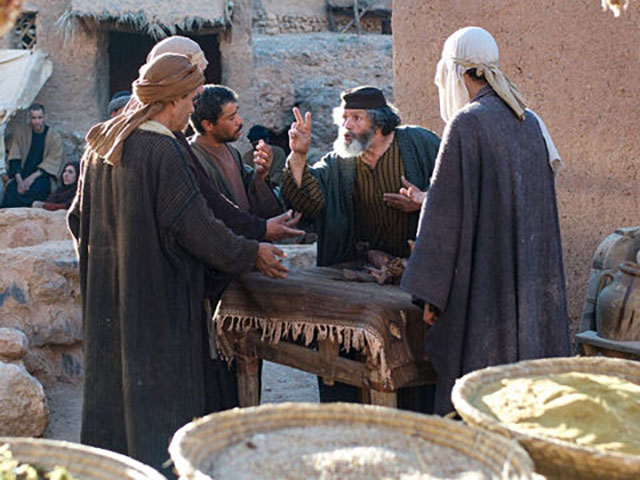Click above to watch video.
OR
Click below to play audio and read along.
Good weekend to you my ‘Walking with Jesus’ friends,
Have you ever ‘overheard’ a conversation which frightened or concerned you? How did you decide what you should do with the secret information you had discovered? Come with me again back to the city of Susa, the capital of the Persian kingdom, about 2400 years ago. We’re in a fascinating story about Mordecai and Esther, remember?
Yesterday we witnessed the unbelievable, the unthinkable, the ultimate little girl’s dream… an unknown girl was chosen by the king to be his queen!! The record says: “So King Xerxes set a royal crown on her head and made Esther queen instead of Vashti. And the king gave a great banquet, Esther’s banquet, for all his nobles and officials. He proclaimed a holiday throughout the provinces and distributed gifts with royal liberality.” (Esther 2:17,18)

Perhaps you are old enough to remember the 1981 fairy tale story of Lady Diana Spencer who married Prince Charles, the man who is now the king of England. That opulent wedding ceremony, in St. Paul’s Cathedral in London, was viewed on TV by an estimated 750 million people!
King Xerxes was the most powerful and wealthy man in the world in 479b. He was sovereign over the 127 province Medo-Persian empire which stretched from what is today India all the way to Macedonia! The truth is Xerxes knew little about his new Queen for she had carefully kept her true Jewish identity a secret.

You may recall Queen Esther had another secret: her relationship with a man who sat frequently at the King’s gate, the main entrance to the Palace. His name was Mordecai, and he had adopted Esther when she was very young and orphaned by the death of her parents. They were actually cousins since Esther’s father Abihail was Mordecai’s uncle. (Esther 2:15) While we might say, ‘oh isn’t that a nice gesture for Mordecai to adopt his infant cousin’, it is another evidence to us of the commitment Mordecai had to God and his Jewish traditions.
It was an important part of God’s laws for His people that orphans be taken in and cared for by next of kin family. It’s the principle of ‘kinsman redeemer‘. Do you remember the story of Naomi, Ruth and Boaz found in the Bible book called Ruth?
The fact that Mordecai sat at the king’s gate is significant, for in ancient times respected elders or officials of a city sat in comfortable, plush chairs, on a raised platform, under a sun shielding canopy, at the city or palace gate, for several specific reasons.
First, they were honored by this preferred place.
Second, they were accessible to the people of the city who desired audiences with the most influential or powerful leaders of the city.
Third, they were judicial guardians of the city making sure business transactions were done legally and resolving conflict issues as judges and making sure only legal residents of that city were permitted inside the city.
In this case, sitting at the King’s gate suggests Mordecai was known to King Xerxes or at least the King’s closest confidant officials. It also means Mordecai had some influence as to who had direct access into the palace and ultimately the king. We don’t know how long Mordecai had been in this role, nor how many others sat at the king’s gate, nor what Mordecai had done to deserve this honor.

The record tells us that one day Mordecai overheard a secret conversation that caused him great concern: “During the time Mordecai was sitting at the king’s gate, Bigthana and Teresh, two of the kings’ officers who guarded the palace doorway, became angry and conspired to assassinate King Xerxes! But Mordecai found out about the plot and told Queen Esther, who in turn reported it to the king, giving credit to Mordecai. When the report was investigated and found to be true, those two officials were impaled on poles! All this was recorded in the books of the annals in the presence of the king.” (Esther 2:21-23) And we could add this statement: ‘and life went on as normal at the palace, with no recognition of Mordecai’s service to the king.’
As we know, friends, the kingship in these kingdoms in ancient times, similar to kingdoms today, was usually inherited from one generation to the next in the royal family. There were no elections. The only alternative for displacing and replacing a monarch was assassination or conquering their nation! Thus, kings were constantly alert to any possible threat to the royal throne, even from within! Xerxes was no different and history tells us he, like other monarchs, had people executed from time to time who were suspected of plotting the overthrow of the kingship.
Let’s pause right here and simply watch humble, wise Mordecai sitting under the canopy with other Persian officials, watching the flow of people in and out of Susa. He was obviously respected by all who knew him, and his wisdom was likely sought frequently.
But his identity as a Jew and his relationship to Hadassah (Esther), as the adoptive father who had raised the Queen, was a secret.
Remember, Mordecai’s father and family could have freely emigrated from Persia to Jerusalem 60 years before when King Cyrus had issued his famous decree of Ezra 1. Now do we see what God was doing as God moved in Mordecai’s father’s heart to stay in Persia.
It’s an important lesson we all must understand: God is always looking into and preparing for the future as He is working in circumstances today! Let’s worship with this song and I’ll meet you here again in Susa on Monday:
Bible images provided with attribution to www.LumoProject.com.
Have a comment or question about today’s chapter? I’m ready to hear from you, contact me here.

Pastor Doug Anderson
“Let us run with perseverance the race marked out for us, with our eyes fixed on Jesus…” (Heb. 12:1,2)
Archived back issues of “Walking with Jesus” and other resources are available by clicking here to open our ‘home page’ (or go to HOME at upper right of this page).
Share with friends. Subscribe below for daily “Walking with Jesus”.


